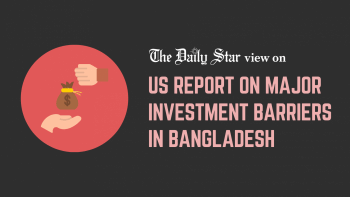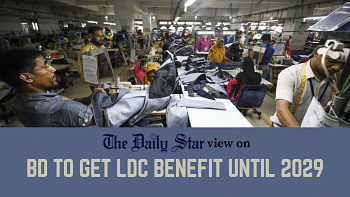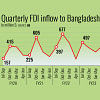Ensuring smooth FDI inflow will be a challenge

Violence centring around the quota reform movement, a five-day total internet blackout, and the ongoing curfew have naturally shaken foreign investor's confidence in Bangladesh, which must be addressed. According to a report in this daily, the country needs to attract foreign direct investment (FDI) equal to 1.66 percent of its GDP annually to become an advanced economy by 2041. But in 2022, Bangladesh's FDI inflow amounted to only 0.75 percent of its GDP. Bangladesh Bank data shows that in 2023, net FDI inflow fell to $3 billion, a decrease of 14 percent from $3.5 billion in 2022. Against this backdrop, the confidence crisis caused by recent events becomes more concerning.
When it comes to attracting investors, a country's reputation as a reliable investment destination is vital. Investors already had a number of issues with Bangladesh in that regard. Problems like corruption, bureaucracy, anti-competitive procurement system, violation of intellectual property rights, and inconsistent policy shifts have all been previously identified as barriers to Bangladesh attracting higher FDI. With several international rights organisations and foreign countries having identified a number of human rights violations during the government's brutal crackdown on protesters recently, the country's image as an investment hub has surely taken a further hit. And this crisis cannot be quantified, as explained by the president of the Foreign Investors' Chamber of Commerce and Industry (FICCI).
The modern nature of business is such that all business activities around the world have become tremendously dependent on the use of the internet. The five-day total internet shutdown—along with the fact that internet services across the country are yet to be fully restored—has had a massive impact on all businesses. And although the country is slowly recovering with limited online and physical connectivity, full operations are yet to be revived. On top of that, foreign investors with a stake in the export sector are anticipating losses and increased expenses due to overtime bills. Some of them will now have to go for costly air shipments to make up for lost time and meet their lead times. And the uncertainty that many businesses and investors faced during the internet outage have made them particularly antsy, with many foreign investors raising questions about the country's political stability.
Even though the government has remained confident about the country's ability to attract FDI despite recent turmoil, we believe there is a lot that can, and should, be done to regain investors' trust. First, the government must urgently restore full internet services, and reinstate normalcy by lowering tensions within society at large. It also needs to take all necessary steps to ensure a positive business environment that is conducive to attracting investment, and that can largely mitigate the losses businesses suffered.


 For all latest news, follow The Daily Star's Google News channel.
For all latest news, follow The Daily Star's Google News channel. 










Comments